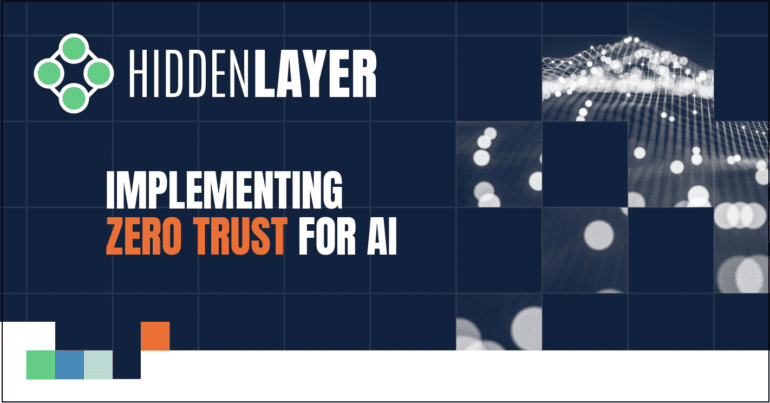TL;DR:
- HiddenLayer, a cybersecurity startup, raises $50 million in funding.
- Investors include M12, Moore Strategic Ventures, Booz Allen Hamilton, IBM, Capital One, and TenEleven.
- The total funding for HiddenLayer now stands at $56 million.
- Funds will be used for expanding the workforce, supporting go-to-market efforts, and investing in R&D.
- HiddenLayer specializes in protecting AI systems from adversarial attacks and offers tools to monitor model integrity.
- The company contributes to MITRE ATLAS, defending against 64 unique attack types.
- Concerns persist about AI security, with government agencies emphasizing pre-deployment testing and monitoring.
- HiddenLayer faces competition but stands out with its AI-driven detection and response approach.
- The company boasts partnerships with Databricks and Intel, as well as Fortune 100 clients.
- As AI adoption grows, organizations increasingly prioritize AI security.
Main AI News:
In a significant development, HiddenLayer, the cybersecurity startup with a focus on safeguarding AI systems from adversarial threats, has successfully secured a substantial $50 million in funding. This funding round was co-led by M12 and Moore Strategic Ventures, featuring notable participation from industry giants such as Booz Allen Hamilton, IBM, Capital One, and TenEleven.
This financial injection propels HiddenLayer’s total funding to an impressive $56 million. The fresh capital infusion will be channeled towards bolstering HiddenLayer’s go-to-market initiatives, which include expanding their workforce from 50 to 90 employees by year-end and further advancing their research and development efforts. Chris Sestito, the co-founder and CEO of HiddenLayer, emphasized the company’s mission, stating, “HiddenLayer is a cybersecurity company focused on safeguarding AI from adversarial threats. Our core objective is to enhance the detection and response capabilities of AI systems.”
Sestito elaborated on the burgeoning demand for their machine learning security platform, stating, “We are witnessing a surge in demand for our services across various industries globally, as organizations increasingly recognize the critical importance of securing their AI infrastructure.”
HiddenLayer, founded in 2019 by Chris Sestito, Jim Ballard, and Tanner Burns, offers a comprehensive platform equipped with robust tools to shield AI models from adversarial attacks, vulnerabilities, and malicious code injections. Central to their approach is continuous monitoring of AI systems, meticulously scrutinizing inputs and outputs to ensure model integrity prior to deployment.
Sestito raised concerns about the common practice among data scientists, who often rely on pre-trained, open-source, or proprietary machine learning models to expedite analysis. This practice, while efficient, exposes organizations to potential transfer learning attacks, especially when utilizing publicly available models that may have been tampered with.
To address these issues, HiddenLayer adopts techniques that observe only the mathematical representations of inputs and outputs, ensuring the system learns the norms specific to each unique AI application without explicit instructions.
Furthermore, HiddenLayer is actively contributing to the MITRE ATLAS, a repository of adversarial AI tactics and techniques maintained by the not-for-profit MITRE Corporation. Sestito asserted that HiddenLayer’s capabilities extend to protecting against all 64 unique attack types listed in ATLAS, encompassing threats such as IP theft, model extraction, inferencing attacks, model evasion, and data poisoning.
Although HiddenLayer’s approach has garnered attention, some experts, including AI researcher Mike Cook, have questioned whether the platform represents a truly groundbreaking innovation. However, they acknowledge the value of HiddenLayer’s efforts to consolidate knowledge about AI attacks and make them more accessible to a wider audience.
While concrete examples of large-scale AI attacks are scarce, government agencies are expressing concerns about potential threats to AI systems. The National Cyber Security Center in the UK has warned of threat actors manipulating AI technologies like large language model chatbots for nefarious purposes, such as accessing confidential information and generating offensive content. Similarly, the US Government’s Office of Science and Technology Policy has recommended pre-deployment testing, risk identification, and ongoing monitoring to ensure the safety and effectiveness of AI systems.
Industry responses to these concerns are mixed. A Forrester study commissioned by HiddenLayer revealed that a majority of companies still rely on manual processes to address AI model threats, with 86% expressing significant concerns about machine learning model security. Furthermore, Gartner reported that two in five organizations experienced an AI privacy breach or security incident within the past year, with 25% of those incidents being malicious.
Chris Sestito remains steadfast in his belief that the threat landscape for AI will continue to expand as the AI market grows, positioning HiddenLayer favorably in this evolving landscape. He acknowledged the presence of other startups offering products to enhance AI system robustness but claimed that HiddenLayer’s AI-driven detection and response approach sets it apart.
HiddenLayer’s success is evident through its partnerships with industry leaders like Databricks and Intel, as well as its impressive client roster, including Fortune 100 companies in the financial, government, defense, and cybersecurity sectors, such as the US Air Force and Space Force.
As AI adoption accelerates across industries worldwide, organizations are grappling with the imperative need to establish robust processes, personnel, and controls to safeguard against the inherent risks and vulnerabilities associated with machine learning. Chris Sestito concluded, “The risks associated with implementing AI and machine learning continue to grow. We are rapidly scaling to meet the burgeoning demand for our platform, which spans industries across the globe.”
Conclusion:
HiddenLayer’s successful funding round demonstrates the growing importance of AI cybersecurity in a rapidly expanding market. With significant investments and partnerships, HiddenLayer is poised to meet the increasing demand for AI protection across various industries. As AI adoption continues to surge, organizations are recognizing the critical need for robust security measures to safeguard their machine learning investments.

